Clinical trial partnership unique to state gives Huntington’s patients hope
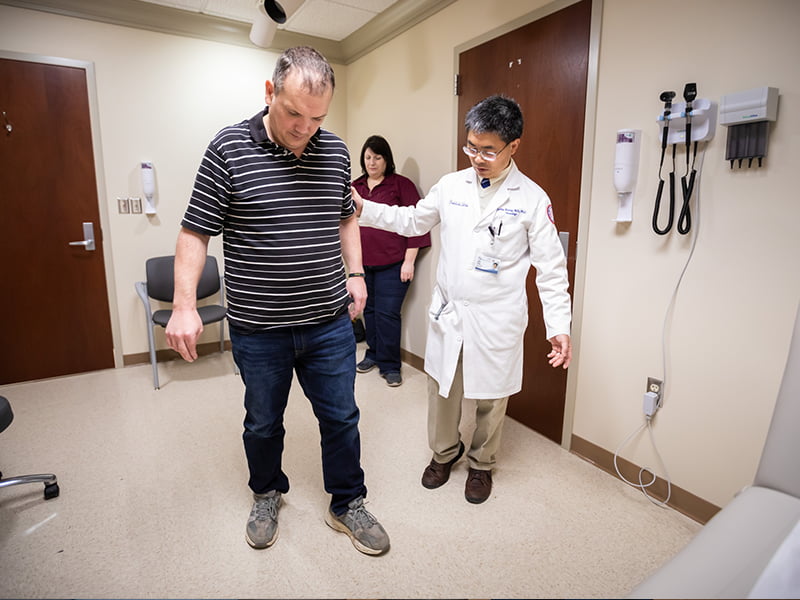
Sometimes, Nathan Wilmoth falls down without catching his foot on something or getting an unintentional push.
It’s not unusual for his wife, Heather, to give him a little explanation that introduces the front end of a conversation, or to wait patiently for him to work through his thoughts. That includes Nathan deliberating a choice between, say, dining at McDonald’s or Burger King.
And sometimes, Nathan shakes, but Heather is ready.
“I say, ‘Let’s go get a glass of milk so we can turn it into a milkshake,’” she said. “We really do have a warped sense of humor.”
That’s part of their life with Huntington’s Disease, a neurodegenerative disorder that kills healthy nerve cells in the brain. That process leads to loss of thinking and reasoning skills, memory, coordination, speech and movement. It’s rare, and it’s genetic.
Nathan, 42, comes by the gene for Huntington’s from his mother. He was tested for it in 2016 after a relative urged them to get life insurance to protect their baby. “It turned out that we had it,” Heather said.
It’s their disease, not just Nathan’s. Together, they manage the symptoms and their "new normal," and they’re hopeful for treatment that can put the brakes on a fatal disease.
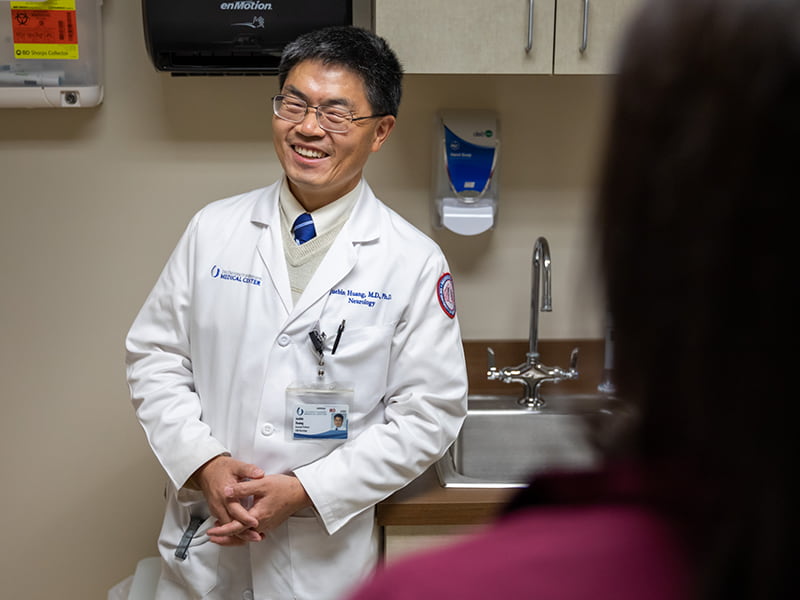
“When I saw him back in 2017, he had a lot of problems in motor control and speech, lots of fidgeting of his arms and legs, and difficulty sleeping,” said Dr. Juebin Huang, an associate professor of neurology at the University of Mississippi Medical Center and an HD care specialist. “He lost his ability to work because of this.”
Through a multidisciplinary approach that pulls in a neurologist, psychiatrist, neuropsychologist, genetic counselor, social worker, registered nurse care coordinator, physical and occupational therapists, speech therapist and other specialties, Nathan and UMMC patients with HD receive a full array of care. That includes education about their disease and how it impacts the entire family.
“Our genetic counseling service is the only one that can provide relevant HD services in Mississippi,” said Huang, a neurologist. “What’s unique for Huntington’s at UMMC is that we offer care as a real team.”
Thanks to education efforts in the state, better coordination of referrals from physicians, plus a public awareness campaign that the Wilmoths have championed, more Mississippians are getting help with a disease that is often misdiagnosed, underdiagnosed or simply baffling to providers who fail to recognize it.
“Our HD clinic has grown tremendously over the past two years. We’ve almost doubled the number of patients we see,” Huang said.
The symptoms of HD are often described as having ALS, Parkinson’s disease and Alzheimer’s disease – simultaneously. There are about 41,000 people nationwide with HD, and another 200,000 who are at risk, according to the Huntington’s Disease Society of America.
“We estimate that there are about 100-200 people in the state who are suffering from HD,” Huang said. “Some of them were diagnosed in the community, and they were told there was nothing they could do about it and to go home and deal with it. Often, they don’t know where to find a doctor willing to take care of them.”
That underscores the need for awareness and access to the right team of providers, Huang said.
“We have a dedicated specialty clinic for this devastating condition,” he said. “Although there’s no cure, over the last decade there have been two medications approved by the FDA to treat the motor symptoms of HD. We have so much more to offer now than 20 years ago.”
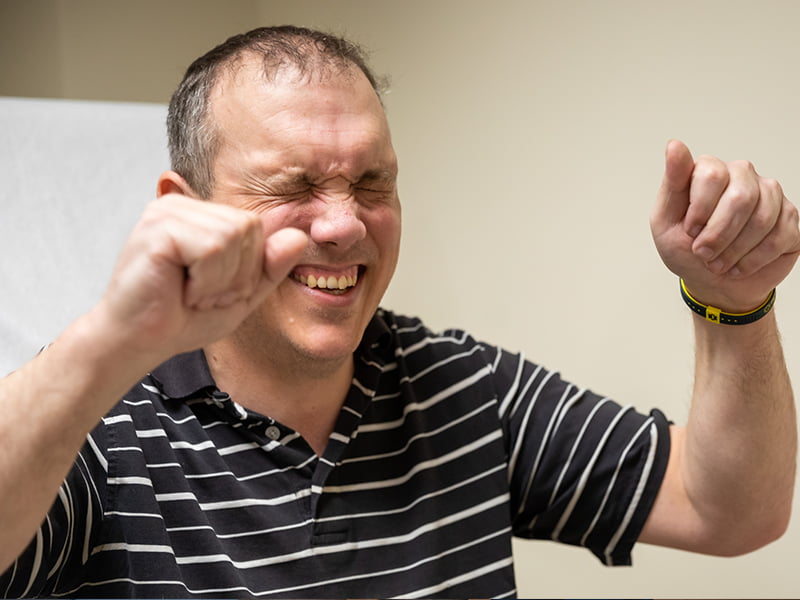
The Wilmoths’ sense of humor about their disease got a kick-start on April 15, 2016, a date Heather can readily cite, and for good reason.
“Our son Haden had tried to eat a Tide pod the night before,” she said. “Nathan was across the street getting his diagnosis, and I was at Batson (Children’s Hospital). Haden was just over a year old, and thank goodness, had only taken a little bite.”
“My mother had it, and her biological father had it,” Nathan said of HD. Even so, “I was kind of shocked” to get the news. “When I was first diagnosed, I only shook.”
Looking back, Heather said, “we can see what the signs were. Nathan was a diesel mechanic, and he had dropped some expensive parts at work. We just didn’t realize what it was.”
There’s more than a glimmer of hope for the Wilmoths, however. UMMC is collaborating with the University of Alabama-Birmingham on HD care, including the chance for Huang’s patients to take part in large and promising clinical trials.
UAB has been designated by the Huntington Disease Society of America as one of 50 Centers of Excellence for 2020. UMMC is designated a tier below that, a Level 1 Partner HD Clinic, that allows its physicians and researchers to work hand-in-hand with a Center of Excellence.
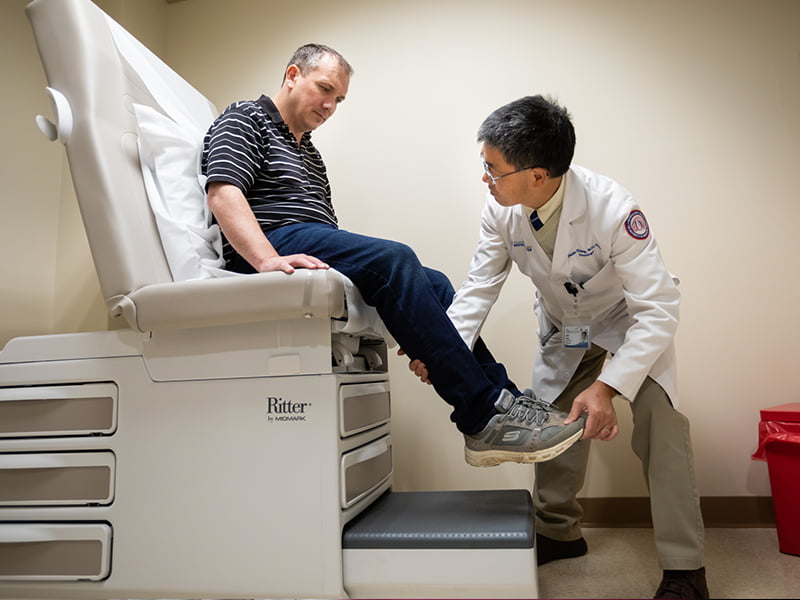
The beauty of the relationship, in addition to taking part in the research possibilities, is the chance to treat patients together and to refer patients between the two programs, Huang said. Dr. Victor Sung, associate professor of neurology in UAB’s Center for Neurodegeneration and Experimental Therapeutics and director of its Huntington’s Disease Clinic, is working with Huang and the Wilmoths to further the collaboration and offer additional treatment to Nathan.
Nathan is part of a two-year, gene therapy clinical trial at UAB that seeks “not just treatment of symptoms,” Sung said. “It’s a curative-type trial. It’s obviously very exciting for patients, and the Wilmoths were very excited to get into it.
“The problem is in the patient’s DNA,” Sung said of HD patients. The experimental drug being used in the trial, manufactured by Roche Pharma, “gets into the brain cells and stops the DNA from making a faulty protein that we think is doing the damage and killing off brain cells. The drug blocks the DNA from making the mutant protein and protects the brain cells.”
The trial is double-blind, meaning that during the lifetime of the trial, the Wilmoths don’t know if Nathan is receiving a placebo via a lumbar puncture infusion or an infusion containing the drug. Sung also doesn’t know.
“There are three arms to the trial,” Heather said. “Patients get either all drugs, all placebos or alternate between the two. We just went for our fifth infusion, but on the very first dose, we firmly believe it was the real deal medicine.”
“It made a difference,” Nathan said.
“it’s hard to say how Nathan is doing, because I don’t know who’s getting what,” Sung said. “But, we’re very hopeful. And at the conclusion of the trial, the company will give everyone in the trial what they know to be the real thing, completely free, until the FDA approves it.”
The potential for this trial in the future, Huang said, also “is for someone who tests positive to get treatment to stop them from getting into the symptoms of HD. That would be huge.”
Sung and Huang take part in a monthly teleconference to discuss their mutual patients and treatment plans and issues. “We have an open line of communication with Dr. Huang, and there are resources we have that he might not have,” Sung said. “It really is a back-and-forth relationship, and it’s something that has been hugely positive for patients. It’s a positive experience for me to be able to collaborate.”
Seven months into the trial, the Wilmoths are adjusting as needed to their disease’s slow progression. “I have to have a special spoon and a shower chair. And not driving … It’s hard sometimes,” Nathan said.
Heather helped start a local support group for families coping with HD. As part of the relationship with Sung and his team, a social worker from UAB’s HD clinic was recently invited to give a patient education program.
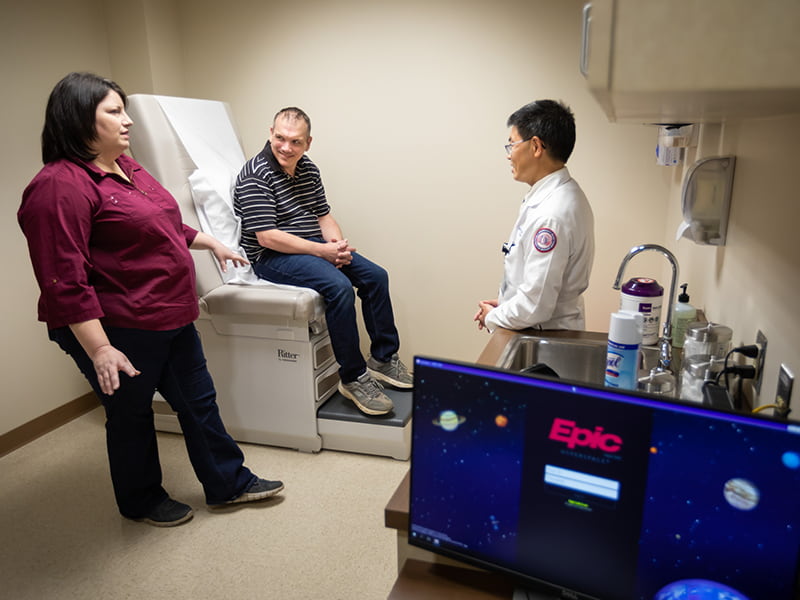
A bright side of the disease, though, is Nathan’s ability to spend lots of time with 5-year-old Haden. “As a diesel mechanic, he’d get home so late,” Heather said. Haden’s childhood memories will be different than those of Nathan’s 14-year-old daughter, Gabrielle, Heather said.
The family divides their time between Brandon and Monticello so that Heather’s mother can help care for Haden while she’s at work at SuperTalk Mississippi.
“We absolutely love both of our doctors,” Heather said of Huang and Sung. “Dr. Huang knew that our hearts were all in for the research. The medical professionals on this journey have been really, really good to us, and Dr. Huang has been so kind to be available if we need anything at all.”
SuperTalk, Heather said, “has been so supportive of us with this,” including the chance for her and Huang to raise HD awareness on-air. “When I say I have a voice and I try to use it, I’m really blessed that we’ve been able to have these opportunities to discuss HD.
“We have some dark humor, but that’s a whole lot easier than crying. We have our moments, but you can have your moments and then you pick yourself up,” Heather said.
“We are trying our best in any way we can. We’re going to fight. We don’t know if the trial will work, but at least we are fighting.”


